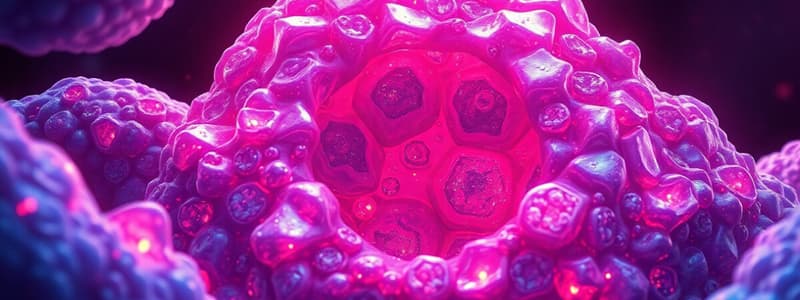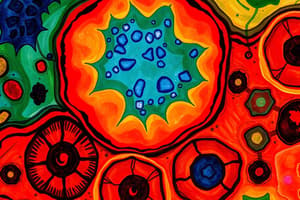Podcast
Questions and Answers
What are the primary characteristics that distinguish epithelial tissue from other tissue types?
What are the primary characteristics that distinguish epithelial tissue from other tissue types?
Epithelial tissue is avascular, forms sheets of cells, possesses distinct surface domains (apical, lateral, basal), and rests on a basal lamina.
How do the junctional complexes in epithelial cells contribute to their overall function?
How do the junctional complexes in epithelial cells contribute to their overall function?
Junctional complexes allow epithelial cells to adhere firmly to each other, maintaining tissue integrity and regulating the passage of substances between cells.
Explain the significance of the specific membrane proteins in epithelial cells.
Explain the significance of the specific membrane proteins in epithelial cells.
Specific membrane proteins determine the properties and functions of epithelial cells, influencing their role in absorption, secretion, and communication.
Describe the role of epithelial tissue in sensory perception.
Describe the role of epithelial tissue in sensory perception.
What is the composition and function of the basal lamina in relation to epithelial tissue?
What is the composition and function of the basal lamina in relation to epithelial tissue?
Flashcards
Epithelial Tissue
Epithelial Tissue
A type of tissue that covers external body surfaces, lines internal cavities, and forms glands. It's also found in sensory organs.
Epithelial Tissue is Avascular
Epithelial Tissue is Avascular
Epithelial tissue lacks its own blood supply.
Epithelial Cell Characteristics
Epithelial Cell Characteristics
Epithelial cells are arranged in sheets, connected by specialized junctions, and have distinct regions with different functions.
Basal Lamina
Basal Lamina
Signup and view all the flashcards
Epithelial Surface Domains
Epithelial Surface Domains
Signup and view all the flashcards
Study Notes
Epithelial Tissue Overview
- Epithelial tissue is avascular, meaning it lacks blood vessels.
- It covers the exterior surface of the body.
- It lines internal closed cavities.
- It forms the secretory portion of glands and their ducts.
- It comprises the receptors of certain sensory organs.
Epithelial Cell Characteristics
- Epithelial cells are arranged in sheets.
- They have intercellular junctions (junctional complexes).
- They exhibit distinct surface domains:
- Apical (free)
- Lateral
- Basal
- Their properties are determined by specific membrane proteins.
- Epithelial cells rest on a basal lamina.
- The basal lamina is non-cellular and protein-polysaccharide-rich.
Studying That Suits You
Use AI to generate personalized quizzes and flashcards to suit your learning preferences.




